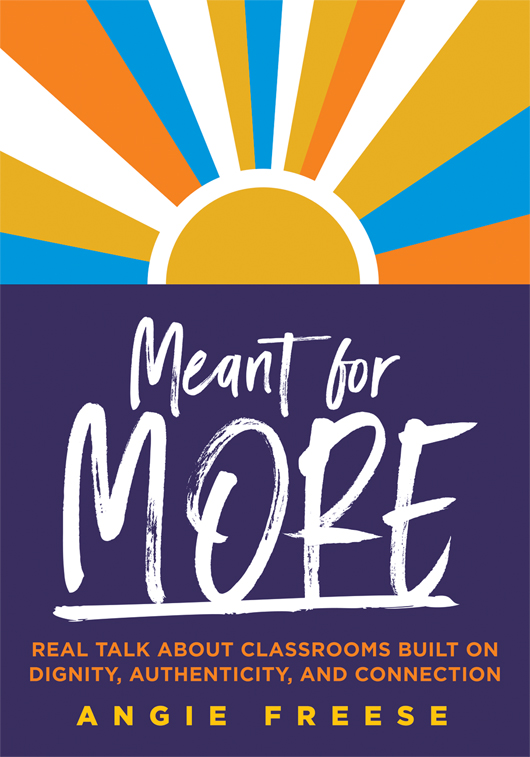Free Reproducibles
Meant for More
Real Talk About Classrooms Built on Dignity, Authenticity, and Connection
“Students rarely underperform when conditions are set up for their academic, cultural, and emotional success,” writes author Angie Freese. Get the tools and strategies you need to cultivate a classroom culture where student voice is valued in a dignified, authentic, and connected learning environment.
Benefits
- Explore the attributes and core tendencies that evolve within Meant for More classrooms
- Study the infrastructure needed to elevate each attribute into learning environments
- Recognize and celebrate your individual strengths and assets
- Lean into vulnerability regarding the barriers to district, school, and classroom success
- Use a continuum to monitor your comfort level with each attribute discussed
- Bring student voice into the dialogue around meaningful, relevant classroom instruction
TABLE OF CONTENTS
Introduction
Chapter 1: Building Awareness to Rehumanize Our Profession
Chapter 2: Embracing Authenticity
Chapter 3: Fostering Connection
Chapter 4: Cultivating Curiosity
Chapter 5: Empowering Voice
Chapter 6: Nurturing Resilience
Chapter 7: Giving Grace
Epilogue: Until We Meet Again
PRINTABLE REPRODUCIBLES
Chapter 1
- Figure 1.3: Current Reality—Gender Expression
- Figure 1.5: Personal Comfort Regarding My Students’ Gender Expression
- Figure 1.6: Current Reality—Status Check on the Impact of Professional Learning
- Figure 1.7: Chapter Summarization Tool to Inspire Action
- Figure 1.9: Evidence That Inspires Action
- Figure 1.10: Determining Our Desired State
- Figure 1.11: Seven As Protocol for Interrupting Inequities and Systemic Barriers
- Figure 1.12: Example Scenario—Seven As Protocol
- Current Reality Reflection
Chapter 2
- Figure 2.2: Self-Acceptance Reflection
- Self-Assessment—Embracing Authenticity
- Connecting to One of My FAULTS
- Spontaneous Connection and Sharing
- Four-Square Share
- Engaging Every Voice With the Help of Sentence Stems
- My Learning DNA (Desires, Needs, Assets) Inventory
Chapter 3
- Growing Empathy and Fostering Connection With Teacher Peers
- Growing Empathy and Fostering Connection With Students
Chapter 4
Chapter 5
Chapter 6
- Figure 6.3: Personal Resilience Reflection
- Figure 6.5: Questions and Ideas for Holding Tight to Hope
- Interpreting the Scaffolding Pillars for Adult Resilience
- Choosing From the Seven Essential Character Strengths of Thrivers
- Interpreting the Seven Crucial Cs of Resilience
- Interpreting the Scaffolding Planks for Adult Resilience
SUGGESTED RESOURCES
Books
- Boogren, T. H. (2018). Take time for you: Self-care action plans for educators. Bloomington, IN: Solution Tree Press.
- Conzemius, A. E., & O’Neill, J. (2014). The handbook for SMART school teams: Revitalizing best practices for collaboration. Bloomington, IN: Solution Tree Press.
- Erkens, C., Schimmer, T., & Dimich, N. (2018). Instructional agility: Responding to assessment with real-time decisions. Bloomington, IN: Solution Tree Press.
- Erkens, C., Schimmer, T., & Dimich, N. (2019). Growing tomorrow’s citizens in today’s classrooms: Assessing seven critical competencies. Bloomington, IN: Solution Tree Press.
- Kanold, T. (2021). Soul!: Fulfilling the promise of your professional life as a teacher and leader. Bloomington, IN: Solution Tree Press.
- Muhammad, A. (2015). Overcoming the achievement gap trap: Liberating mindsets to effect change. Bloomington, IN: Solution Tree Press.
- Muhammad, A., & Cruz, L. (2019). Time for change: 4 essential skills for transformational school and district leaders. Bloomington, IN: Solution Tree Press.
- White, K. (2022). Student self-assessment: Data notebooks, portfolios, and other tools to advance learning. Bloomington, IN: Solution Tree Press.
Websites
- A Guide for Supporting Transgender Students in K–12 Schools
- GLSEN Policy Maps
- Panorama Student Survey
- Project Implicit
- The Power of Positive Relationships
- UNICEF Canada
- UNICEF Canada Elementary Resources
- Diversity Equity Outreach Consulting
- Youth Voice and Engagement
- The Power of a Democratic Classroom
- Building Content Knowledge tool
- Implicit Association Test
- Circle of Concern strategy
- Relationship Mapping strategy
- How to Get Your Students to Ask More Questions
- Youth Participatory Action Research
- Student SEL Data Reflection Protocol
- Resiliency Wheel
- Everyday Health Resilience Assessment
- Resilience scales

